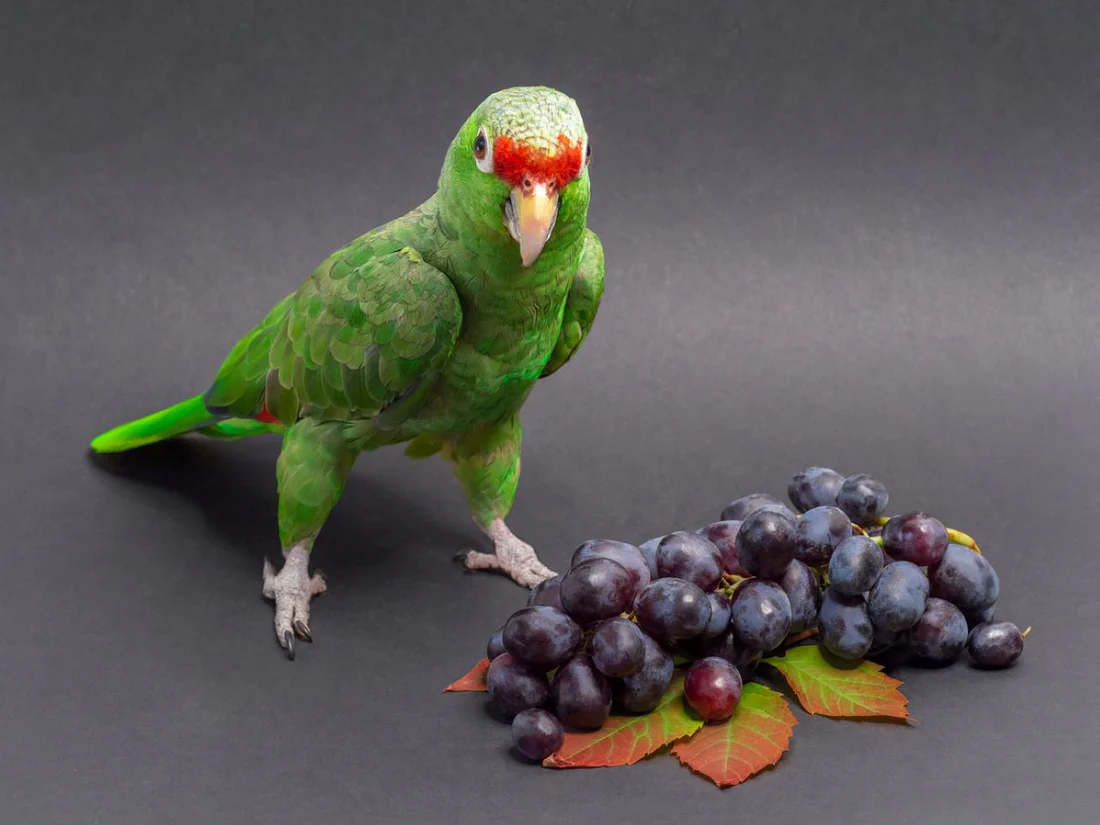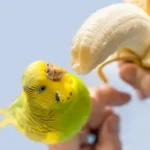
Can Parrots Eat Grapes (Including Seeds and Peels) – Safe Or Toxic?
Parrots love fruits, and grapes is one of them. Be it quaker parrots, green cheeked conures, macaws, African greys, or cockatiels, parrots and parakeets can eat all types of grapes including green, white, red, and black. Grapes have a very sweet taste, and parrots have a sweet tooth. It’s no wonder why they always choose grapes over any other fruits when you offer grapes as part of their daily diet.
Grapes are a perfect fruit choice for parrots because it’s more nutritious. But as much as you’d like to give your parrot a quick energy boost, always remember not to give them too much of it too frequently.
THE VERDICT: Can parrots eat grapes? YES, parrots can eat grapes, but IN MODERATION. Read why below!
Jump To Section
Are Grapes Safe for Parrots?
Grapes are generally safe for parrots – that is, they are not inherently toxic to them. However, there are a few points you’ll need to take note of.
Eating too many grapes is not ideal for your parrots. They contain high fructose, and overfeeding could harm your parrot’s health. You can think of grapes as a treat for your parrots and not as a regular diet. How many grapes to feed a bird depends on the size of the bird. It is hard to set a specific amount, so I would go by my personal recommendation (this is by no means an expert recommendation). For example, I would not give a small parrot more than half a grape each time, while medium to large birds can have a whole grape. I would also not feed my birds grapes more than three times a week.
Excessive feeding of grapes may result in your parrot neglecting other food. This may lead to nutritional deficiencies, which could be life-threatening for your bird. If in doubt, giving less is always better than giving more. You can also engage the advice of an avian nutritionist or a vet to check a suitable amount to feed your birds.
Grapes are one of the fruits with the highest amount of pesticides found on their skin and even in the pulp. It is important to give grapes in moderation and not until you have thoroughly washed them (or even removed their skins).
Are Grapes Beneficial to Parrots?
Grapes are rich in nutrients essential for parrots. They are packed with vitamins and minerals that offer a wealth of benefits to the parrot’s health. Aside from getting a burst of a juicy and sweet taste when they bite a grape, parrots also get a dose of antioxidants that help them stay healthy throughout their life.
Nutritional information of grapes
Here is some information of six beneficial components found in grapes that can benefit your parrot:
Antioxidants
Grapes are rich in antioxidants that enhance the health of the parrot’s heart and prevent free radicals from causing long-term complications, such as diabetes and cancer.
Grapes also contain a powerful antioxidant known as resveratrol, also categorized as polyphenol. According to Sridhar et al, resveratrol in birds’ diets helped increase oxidative enzyme activity, and also reduced the impact of aflatoxicosis (a disease caused by fungal toxins commonly found in improperly-stored bird food).
Fiber
Grapes are a good source of soluble and insoluble fibers. Fiber is processed and converted into energy that improves the activity and health of the digestive system.
Besides, the insoluble fibers facilitate water retention upon entering the gastrointestinal tract. This stimulates the stomach and intestines; therefore, contributing to healthy bowel movements.
Potassium
Grapes contain potassium that facilitates bone and hormone development. Therefore, it increases the parrot’s ability to recover from injuries. It also ensures that the parrot’s heartbeat stays regular.
Potassium is also responsible for maintaining an ideal electrolyte balance in birds. It moves nutrients into the cells and eliminates waste products out of the parrot’s body. In addition, potassium also enables metabolization of proteins and glucose processing.
Vitamin C
Grapes contain all vitamins, but it’s more packed with Vitamin C, which enhances parrot’s immunity. It also facilitates connective tissue, blood vessels, muscle, and bone development.
Vitamin C is vital to the parrot’s body healing process. However, you have to constantly supplement Vitamin C in their diet since it cannot be stored in their bodies for long.
Proteins
Proteins found in grapes enhance the health of the eyes by improving the photoreceptor cells in the retina. It lowers the amount of inflammatory proteins and increases the level of protective proteins in the retina; hence, boosting eye vision.
Manganese
Grapes contain manganese that facilitates overall growth and bone formation in parrots. Manganese plays a role in formation of sex hormones that’s essential for healthy reproduction. Therefore, you should supplement manganese if you plan on breeding parrots. It also enhances normal functioning of the nerves and brain.
Why You Should Not Feed Your Parrot Lots of Grapes
Feeding your parrots large amounts of grapes is harmful to their health. Excess feeding of grapes may lead to:
Weight Gain
While they are great for the general well-being of a parrot, grapes are loaded with sugar that would result in obesity. An obese parrot is more susceptible to diseases. So, it’s better if you avoid feeding your parrot too many grapes.
Vitamin Deficiency
Parrots can easily neglect other foods if you give them grapes on a regular basis. This may result in vitamin deficiency, a disorder arising from an unbalanced diet.
Do Grapes Contain Any Toxins?
Grapes do not inherently contain any toxins. According to Bloorcourt Veterinary Clinic, so far no toxic agent has been identified in grapes. Restricted feeding of grapes has nothing to do with the presence of toxins.
The only concern is of the pesticides that are very often found in grapes. Grapes are one of the most “contaminated” fruits, among several others. I always give my birds grapes without the skin, but this means a large part of the antioxidants are lost as they are mostly contained within the skin. Since there is no perfect solution for this, it is always recommended to feed grapes in moderation.
Can Parrots Eat Grapes’ Seeds and Peels?
Unlike the seeds of certain fruits, grape seeds are generally not a problem for parrots. Grape seeds for instance contain beneficial nutrients. Besides, parrots enjoy cracking the seeds though they taste slightly bitter. The only concern is with the size of your parrot. You’ll need to break the seeds into smaller sizes if your bird is too small.
Grape peels also contain antioxidants as well as other nutrients. You will need to wash the peels thoroughly to get rid of pesticides and other chemical contaminations on the surface. This is because grapes have a waxy coat that chemicals could easily stick onto.
Avoid the peels if you have doubts regarding pesticide contamination. Washing doesn’t guarantee that the grapes will be 100% free of chemicals. Additionally, the highest amount of pesticide residue is usually found in grape peels. While water washing them can significantly reduce the amount of chemicals, we do not know how badly it can affect our pet birds if eaten in large quantities.
Are Grapes Harmful to Baby Parrots?
Just like in adult parrots, grapes are beneficial to baby parrots as well. However, you should avoid feeding excess grapes to baby parrots for similar reasons as adult parrots, mentioned above.
You will also need to cut the grapes into smaller pieces, and separate the seeds and the peels before feeding them. Baby parrots may choke while swallowing the seeds. Besides, their digestive system is not yet fully developed and may not be able to tackle grape seeds.
How to Give Your Parrot Grapes
As mentioned earlier, parrots do enjoy eating grapes. Grapes are very sweet and attractive to them. You can experiment this by giving your parrots a mixture of fruits including grapes. There’s no doubt they’ll go for grapes leaving behind the other mix of fruits.
However, there will always be birds that are new to fresh foods. Loki, my lovebird, has never ever been able to accept wet and juicy foods, including fruits and vegetables. For such birds, try offering grapes in various way to pique their interest. You can tie the grape in the cage for them to nibble on, perhaps chop the grape up into small pieces to be added to their food, or mash it up to offer as a juicy pulp.
How Many Grapes Can My Parrot Have?
As mentioned earlier, grapes need to be given in moderation. A small parrot can be given half a grape while a larger parrot can be given a whole grape. Grapes should preferably not be given daily. Do not rely on grapes as the only vitamin supplement. There are other fruits such as berries, which are highly beneficial to parrots that you can switch to from day to day for variety. Keep in mind that a well-balanced diet for your parrot is important, even if they beg for more grapes.
Final Notes
Grapes contain several beneficial nutrients for your parrot. It’s easy to incorporate grapes in a parrot’s diet because they love grapes. Grapes are delicious but beware of feeding your parrots excess grapes. Grapes should be fed in moderation. They should also be washed thoroughly to reduce the risk of pesticide contamination.
Parrot Junkie www.parrotjunkie.com
Copyright © 2021-2024. All rights reserved.



Be the first to leave a comment